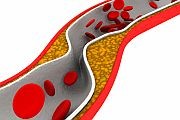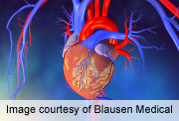Tag: Aspirin
CDC: Aspirin Use Common Among Americans With Heart Disease
Clinical and community-based approaches should be used to increase aspirin use among low-use groups
Review: Short vs. Long Duration Dual Antiplatelet Tx After Stent
Longer DAPT linked to reduced stent thrombosis and myocardial infarction, increased bleeding, mortality
ATS: Aspirin Use Linked to Slower Progression of Emphysema
Slower progression of percent emphysema on CT after adjustment for multiple variables
Over Half of Middle-Age, Older Americans Take Daily Aspirin
Having discussed aspirin with provider is the strongest predictor of regular use
AACR: Regular Aspirin Use Linked to Lower GI Cancer Risk
Greatest benefit from aspirin required taking it for at least 16 years
Aspirin Use Not Found to Benefit Prostate Cancer Mortality
Increased risks of mortality restricted to aspirin use after the diagnosis of prostate cancer
Individual Short-Term Responses to Antiplatelet Therapy Vary
Variability within individuals from pre-discharge to one week after discharge, but not thereafter
Genetic Variation Impacts Aspirin/NSAID Link to CRC Risk
Use of aspirin, NSAIDs lowers risk of CRC in association with genetic variation at two SNPs
AAN: Aspirin Resistance Predicts More Severe Stroke
What causes aspirin resistance isn't known
Four-Times Daily ASA More Effective in Post-CABG Patients
Multiple 81 mg ASA more effective for suppressing serum TBX2 formation, platelet aggregation














